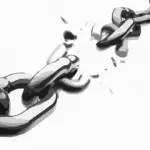
One way to move house quickly once your offer is accepted is to buy a chain free house, which means the sellers have no onward chain to slow the conveyancing process down.
But sellers are not always truthful about their true intensions, and may be lying about no onward chain and the seller may have lied about being chain free.
If your seller lied about being chain free and said there’s no onward chain you can withdraw from the property purchase, or continue to completion on the basis you’ve invested time and money in the conveyancing process. Otherwise you’ll be back to the beginning and these costs will have been wasted.
Please also read this article to discover how you could save £71,475 on your next mortgage if you sell your house and rent before buying again. Even I was amazed when I did the calculations! The strategies you learn in this article will not only save you money, but it will also reduce the stress of buying your next house.
What does “chain free” mean?
The term “chain free” means the seller doesn’t need to buy a new property for them to sell their current home, which is good news for buyers. Chain free means you’re not reliant on the seller to complete on their next property, so there is less chance the transaction will fall through.
What does “no onward chain” mean?
The term “no onward chain” is another way of saying “chain free“, which means the seller isn’t dependent on the sale of their current home to buy their next property. This means the sellers might be moving to rented accommodation, moving in with friends or family or they’ve already bought another house.
Seller lied about being chain free
If your seller lied about being chain free there is nothing you can do about it. Your decision is between withdrawing from the purchase to find another chain-free property, or continue with the purchase as you’ve already invested time, the cost of conveyancing fees and survey costs.
Lying about no onward chain
If your seller has lied about no onward chain there is not much you can do about it. Your choice is between withdrawing from the purchase to find another property with no onward chain, or continue with the purchase as you’ve already invested time, the cost of conveyancing fees and survey costs.
Seller may not be lying
It may appear the seller lied about being chain free, but they have simply had a change of circumstances instead. Whereas before they might have been moving to a friend’s of family home, this may no longer be an option. It’s also possible they’ve since found a property they love and want to buy instead of renting.
Speak with the estate agent to ask them why the seller said they were chain free at the start of the process, and ask about what has changed. Knowing this may not help your situation, but it might make you feel better if you discover the sellers weren’t lying about being chain free.
Whilst it’s no consolation, it’s slightly better to view the sellers as people who have changed their mind, rather than as liars. But if the estate agent has failed to communicate the change of mind by the sellers, this is something you should take up with them, and raise a complaint.
When people start looking into moving to rented accommodation, there is often a realisation it’s not as straight forward as they originally thought.
For example, if the sellers own pets, not all landlords accept pets. If the sellers have children, this makes moving into rented accommodation more complicated, especially if they intend to move again.
Will it take longer to buy a property if the seller lied about being chain free?
It’s likely to take longer to buy a property if the seller lied about being chain free, as the sellers now have the conveyancing process to go through. This is made worse, and the conveyancing process will take longer if the sellers of your sellers next property are also in a chain.
What may slow down completing your purchase on your seller’s house is if they are not chain free and they’ve yet to find their next property. If they haven’t found somewhere to buy, this may take a while. Plus they still have to go through the conveyancing process.
What is the legal position if the seller lied about being chain free
If your seller has lied about being chain free, there is no legal recourse, and you can’t sue the seller as there’s no legally binding contract to enforce until contracts are exchange.
Once contracts are exchanged it makes no sense to start suing the seller for lying about no onward chain.
But if you decide to sue the seller, the legal costs would be expensive, and there’s no guarantee you would win.
Even if you do win, you may not get your legal costs back in any event. In England and Wales, there are no guarantees that you will complete on a property in any event, as a buyer or seller can pull out up to the day of exchange.
How do you know if a property has no onward chain?
If a property has no onward chain the estate agents will usually put this into the sales particulars as it’s a selling point. When you search for properties on Rightmove, you often see it advertised as “No onward chain“.
Reasons why a property is selling with no onward chain
There are many reason why properties are sold as having no onward chain, which niclude:
- The vendor is moving to rented accommodation.
- The sellers are moving in with friends of family.
- The sellers have already purchased another property to move into.
- The vendors have already moved out.
- The vendor is an investor and the property is an investment property.
- The sale is a probate sale.
Final thoughts on lying about no onward chain and seller lied about being chain free
If your sellers are lying about no onward chain and lied about being chain free, this may raise other concerns about what else they have lied about. However, if you discover they haven’t lied about being chain free, at least you can feel more comfortable about their integrity.
Whether the seller has lied about being chain free or if they have changed their mind, you could put pressure on them by threatening to withdraw from the purchase. If the sellers want the sale to go through, they may decide to continue as chain free sellers instead.
It will be up to the seller if they want to keep to their original promise and sell with no onward chain, or risk losing the sale of their property. But at the end of the day, as there is no contract you cannot force the vendor to move into rented accommodation.
One other thought is you could reduce your offer on the basis your moving time will be slower due to the sellers needing to buy a property.
But in the end it’s better to step back, take a deep breath and move on. If you still like the house and you still want to buy it, you will have to be patient.
Having said that, this change may affect the sale of your property and your buyers may get impatient if the sales chain has suddenly extended.
You will need to carefully manage your buyers expectations, and it is sometimes best to ask your estate agent to do this for you.
Please don’t forget to read this before you leave…
Please don’t forget to also read this article to discover how you could save £71,475 on your next mortgage if you sell your house and rent before buying again. As I said earlier, even I was amazed when I did the calculations! Learn about how you will reduce the stress of moving house, whilst at the same time potentially save thousands in the process!
I hope you’ve enjoyed this article about lying about no onward chain + seller lied about being chain free
If you’ve enjoyed this article about “lying about no onward chain + seller lied about being Chain Free” please share it on your favourite social media site.
Also, if you have any questions, please feel free to comment below too. Please also share any of your experiences with properties you’ve bought. Alternatively, if you need more help, please feel free to contact us on our contact us page here. Or join the discussion and ask your question in the property forum.




